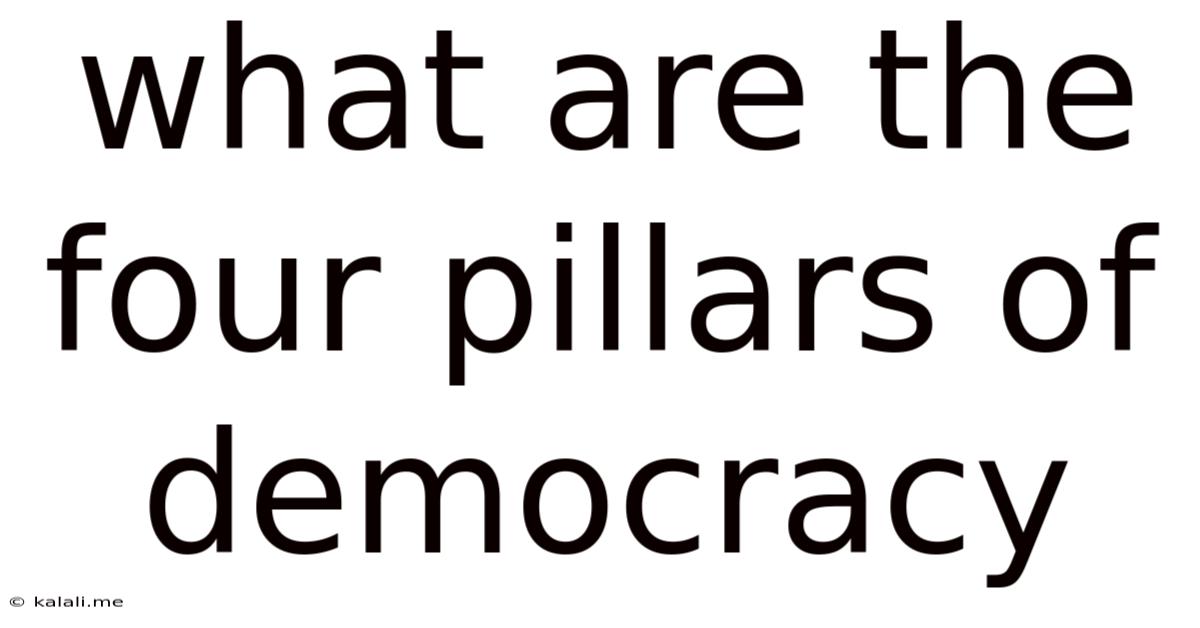What Are The Four Pillars Of Democracy
Kalali
Jun 11, 2025 · 4 min read

Table of Contents
What are the Four Pillars of Democracy? Understanding the Cornerstones of a Free Society
Democracy, often lauded as the best form of government, isn't simply a system of voting. It's a complex interplay of institutions and principles designed to ensure freedom, equality, and the rule of law. While different democracies may emphasize certain aspects more than others, four pillars consistently underpin a thriving democratic society: fair elections, protection of rights and freedoms, the rule of law, and an independent judiciary. This article delves into each of these crucial components, exploring their importance and interdependence.
1. Fair Elections: The Foundation of Democratic Legitimacy
Fair elections are the bedrock of any democratic system. They provide a mechanism for citizens to choose their leaders and hold them accountable. Key characteristics of fair elections include:
- Free and Secret Ballot: Every citizen should have the right to vote without coercion or intimidation, and their vote should be kept confidential.
- Universal Suffrage: The right to vote should be extended to all adult citizens, regardless of race, gender, religion, or socioeconomic status. This principle ensures inclusive representation.
- Regular Intervals: Elections should be held at regular intervals, preventing any single leader or party from accumulating excessive power.
- Transparency and Accountability: The electoral process itself must be transparent and accountable, with mechanisms in place to prevent fraud and ensure accurate vote counting.
- Independent Electoral Commission: A neutral and impartial body should oversee the electoral process, guaranteeing fairness and impartiality.
Without fair and regular elections, the other pillars of democracy cannot effectively function. A government that doesn't derive its power from the consent of the governed lacks legitimacy and is susceptible to authoritarianism.
2. Protection of Rights and Freedoms: Safeguarding Individual Liberty
Protecting fundamental human rights and freedoms is crucial for a functioning democracy. These rights, often enshrined in constitutions and international treaties, typically include:
- Freedom of Speech and Expression: The ability to express one's views without fear of censorship or reprisal is vital for open debate and informed decision-making.
- Freedom of the Press: A free press acts as a watchdog, holding power accountable and informing the public.
- Freedom of Assembly and Association: Citizens should be able to gather peacefully and form organizations to advocate for their interests.
- Freedom of Religion: Individuals should be free to practice their religion or belief without interference.
- Right to Due Process and a Fair Trial: Everyone is entitled to a fair and impartial trial, with the right to legal representation and protection from arbitrary arrest or detention.
These rights are not merely abstract ideals; they are essential for empowering citizens to participate actively in their democracy and holding the government accountable. Restrictions on these freedoms often signal a decline in democratic values.
3. The Rule of Law: Ensuring Equality and Predictability
The rule of law dictates that everyone, including those in power, is subject to and accountable under the law. This principle ensures:
- Equality before the Law: No one is above the law, regardless of their social status, wealth, or political influence.
- Predictability and Certainty: Laws should be clear, consistent, and applied equally to all, creating a stable and predictable environment.
- Transparency and Accessibility: Laws and legal processes should be accessible and transparent to the public.
- Independent Judicial System: A fair and independent judiciary is essential for upholding the rule of law.
The rule of law fosters trust in the government, protects individual rights, and promotes social order. Without it, arbitrary power and corruption can thrive, undermining the entire democratic structure.
4. An Independent Judiciary: The Guardian of Justice
An independent judiciary serves as a crucial check on the power of the executive and legislative branches. Its independence ensures:
- Impartial Justice: Judges are free from political pressure and can make decisions based solely on the law and evidence.
- Enforcement of the Law: The judiciary ensures that laws are properly enforced and that those who violate them are held accountable.
- Protection of Rights: The courts protect the fundamental rights and freedoms of citizens against government infringement.
- Judicial Review: In many democracies, the judiciary has the power to review laws passed by the legislature and actions taken by the executive, ensuring their compatibility with the constitution.
A weak or compromised judiciary allows for abuses of power, eroding the other pillars of democracy and creating an environment of fear and injustice.
In conclusion, these four pillars – fair elections, protection of rights and freedoms, the rule of law, and an independent judiciary – are interconnected and mutually reinforcing. The weakening of one pillar inevitably weakens the others, threatening the stability and legitimacy of the entire democratic system. Understanding these foundational elements is critical for both citizens and policymakers striving to build and maintain a truly democratic society.
Latest Posts
Latest Posts
-
How Long Does It Take To Drive 20 Miles
Jul 01, 2025
-
How Many Cups Is One Pound Of Pasta
Jul 01, 2025
-
How Many People Does A Gallon Of Tea Serve
Jul 01, 2025
-
How Many 750 Ml In A Gallon
Jul 01, 2025
-
How Long Is 90 Days In Months
Jul 01, 2025
Related Post
Thank you for visiting our website which covers about What Are The Four Pillars Of Democracy . We hope the information provided has been useful to you. Feel free to contact us if you have any questions or need further assistance. See you next time and don't miss to bookmark.